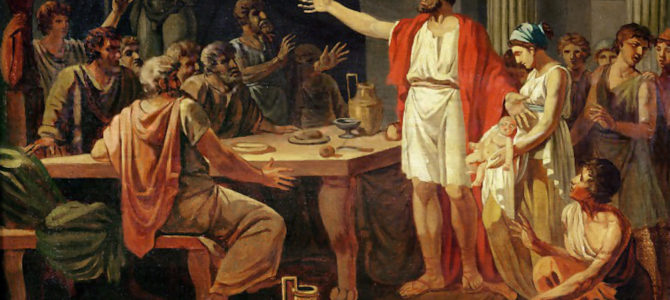
In the eighth lecture of Hillsdale College’s course on the histories of Athens and Sparta, which you can follow along with me here, Paul A. Rahe, a Western Heritage professor at Hillsdale, explains Sparta’s demise after its victory in the Peloponnesian War.
Sparta’s Success In The Peloponnesian War
After the Peloponnesian War, Sparta attempted to create an empire after it defeated Athens. Sparta’s society relied on its citizens to be disciplined — a quality that broke down amongst the people outside of the Peloponnese and led to disarray.
After military and social leader Alcibiades encouraged the Athenians to invade Sicily, the Athenians decided to recall him and try him on charges of impiety. Rather than return home and face certain death, the Athenian general fled to Sparta and helped them in their fight against his own people. His help played in integral role in tipping the scales in Sparta’s favor throughout the Peloponnesian War.
Throughout the conflicts between the Greek cities, a war of succession in Persia was underway. King Darius II sent his second son, Cyrus the Younger, to Asia Minor, where he met Lysander of Sparta. Cyrus formed an alliance with the Spartan general with the hope that the Spartans would lend military support in his efforts to ascend the throne and fight his older brother’s efforts to attain the throne. In 405, Lysander destroyed the Athenian fleet of ships, spurring Athens to promptly surrender.
After being defeated by the Spartans, the Athenians warned they would not be able to sustain an empire because their society depended upon strict adherence to rules and a discipline among the people that could not be duplicated elsewhere. The Athenians told their longtime rivals that outside peoples would resent Spartan rule and ultimately turn against them if the Spartans tried to impose their way of life on others. Integrating other people groups with different values and lifestyles would also corrupt their people’s sense of discipline — a shift that ultimately led to Sparta’s downfall.
Sparta Builds An Empire
The small geographic space Sparta occupied before the war helped the Spartan people stay disciplined. Within the Peloponnese, everyone knew one another and everyone was watching one another’s actions, but when the empire expanded outside of this small peninsula, the Spartans lost their sense of discipline while away from the watchful eyes of their neighbors.
The Spartans were harsh enough to their allies, namely Corinth and Thebes, to spur these cities to seek an alliance with one another in opposition to Sparta. The Persians, seeing these tensions among the Greek city states, played them against one another in an effort to keep Sparta from amassing too much power. Thebes was aggrieved to the point of facing Sparta in the Battle of Leuctra, which Sparta would lose, in 371 B.C.
As a consequence of victory, not defeat, Sparta fell. When Sparta sought to impose rule on other cities, it did so by imposing their way of government, marshal rule, upon all of the varying cities and people groups it conquered, regardless of their cultural predilections. This caused tensions among the cities Sparta ruled and spurred them to rise up against them.
What We Should Learn From Sparta’s Demise
Sparta’s rise and fall is worthwhile to understand because it offers an example of a society that was organized effectively — a rarity among people, even to this day. Sparta’s foreign policy decisions flowed out of its domestic policies. In other words, Sparta’s relations to other cities and other people’s reflected the priorities of the Spartans at home. To understand the Spartan regime requires one to understand their way of life — their values, religious beliefs, and culture.
When Sparta began to expand, it did so to the detriment of the Spartan way of life. By weakening the resolve of the Spartan people through expansion, the empire became weak. The Spartans opened themselves to attacks when they tried to impose their way of life upon the people they subjugated. Outsiders did not share the extreme loyalty and dedication to the state that native Spartans possessed, and those tensions weakened the empire.
This mistake, this critical miscalculation, is an important one for other peoples living in other times and regimes to understand. One cannot force one society’s way of life upon another without a similar cultural framework already in place.









